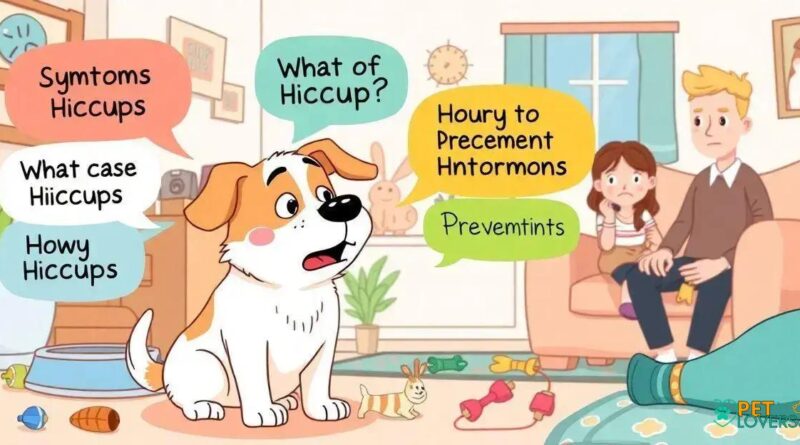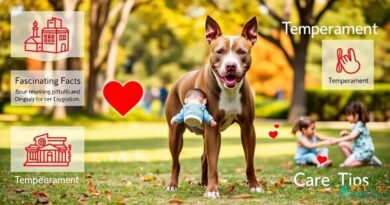Why Does My Dog Have Hiccups? The Surprising Answer!
Hiccups in dogs are involuntary contractions of the diaphragm that can occur due to factors like eating too quickly, drinking excessive water, or stress. While generally harmless, they can be alleviated using techniques such as the ‘hold and gentle pressure’ method or the ‘Valsalva maneuver.’ If hiccups persist, consulting a veterinarian is advisable to ensure the dog’s well-being.
Have you ever noticed your furry friend, the family dog, experiencing the infamous ‘hiccup fit’? It’s not uncommon for dogs to get hiccups, just like humans do, but the reasons behind it might surprise you.
In this article, we’ll explore the possible causes of hiccups in dogs and provide you with some helpful tips to ease their discomfort.
So, let’s dive in and find out why your dog has hiccups!
Symptoms of Hiccups in Dogs
Symptoms of Hiccups in Dogs may include sudden, involuntary contractions of the diaphragm, which can lead to a characteristic ‘hiccup’ sound.
Other signs of hiccups in dogs may include rapid breathing, a tense abdomen, and a possible sudden stop in breathing.
In some cases, hiccups in dogs may be accompanied by other symptoms such as coughing, panting, or even a slight loss of appetite.
What Causes Hiccups in Dogs
What Causes Hiccups in Dogs is often linked to the sudden contraction of the diaphragm, which can be triggered by various factors, such as eating too quickly, drinking too much water, or inhaling irritants.
Additionally, some medical conditions, such as gastroesophageal reflux disease (GERD), respiratory infections, or anxiety, can also contribute to hiccups in dogs.
In some cases, genetic predisposition may also play a role.
How to Relieve Hiccups in Dogs
If your dog is experiencing hiccups, there are several ways to relieve the discomfort. One approach is to try the ‘hold and gentle pressure’ technique, where you apply gentle pressure to your dog’s diaphragm by holding their abdomen in a gentle, downward motion.
You can also try the ‘Valsalva maneuver’, which involves pinching your dog’s nostrils shut and gently blowing air through their nose to stimulate the vagus nerve.
In some cases, hiccups may be treated with medication, such as antacids or anti-anxiety drugs. It’s essential to consult with a veterinarian to determine the best course of treatment for your dog’s hiccups.
Preventing Hiccups in Dogs
Preventing Hiccups in Dogs can be achieved by maintaining a healthy lifestyle, including a balanced diet, regular exercise, and stress reduction techniques.
Avoiding sudden changes in your dog’s environment, such as loud noises or sudden movements, can also help prevent hiccups.
Additionally, ensuring your dog gets enough sleep and avoiding eating too quickly or drinking too much water can also reduce the likelihood of hiccups.
By taking these preventative measures, you can reduce the risk of your dog experiencing hiccups and keep them comfortable and happy.
FAQs About Dog Hiccups
FAQs About Dog Hiccups often include questions such as ‘How long will my dog’s hiccups last?’ or ‘What are the possible complications of hiccups in dogs?’ In this article, we’ve covered the symptoms, causes, relief methods, and prevention strategies for hiccups in dogs.
If you have any further questions or concerns, consult with a veterinarian for personalized advice. Remember to stay calm and patient, as hiccups in dogs are usually a harmless condition that will resolve on its own with proper care and attention.
In conclusion, understanding the symptoms, causes, and relief methods for hiccups in dogs can help you provide the best possible care for your furry friend. By implementing the prevention strategies and consulting with a veterinarian, you can reduce the risk of your dog experiencing hiccups and keep them comfortable and happy.
Remember to stay calm and patient, as hiccups in dogs are usually a harmless condition that will resolve on its own with proper care and attention.
Frequently Asked Questions About Dog Hiccups
What are the common causes of hiccups in dogs?
Hiccups in dogs can be caused by eating too quickly, drinking too much water, inhaling irritants, or experiencing stress and anxiety.
How can I relieve my dog’s hiccups?
Try the ‘hold and gentle pressure’ technique, the ‘Valsalva maneuver,’ or consult with a veterinarian for further advice.
Can hiccups in dogs be prevented?
Yes, maintaining a healthy lifestyle, avoiding sudden changes, and ensuring your dog gets enough sleep and doesn’t eat too quickly or drink too much water can help prevent hiccups.
What are the possible complications of hiccups in dogs?
In rare cases, hiccups can lead to complications such as aspiration pneumonia or respiratory distress.
How long will my dog’s hiccups last?
Hiccups in dogs usually last for a short period, but it’s essential to monitor your dog’s condition and consult with a veterinarian if the hiccups persist or worsen.
Can I treat my dog’s hiccups at home?
Yes, some methods such as the ‘hold and gentle pressure’ technique or the ‘Valsalva maneuver’ can be tried at home. However, if your dog’s hiccups persist or worsen, it’s recommended to consult with a veterinarian.




